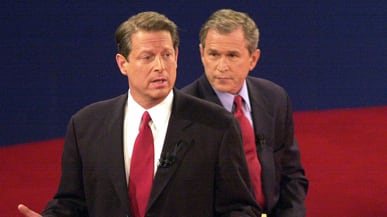Passions are supposed to recede with time as wisdom and maturity, but the Supreme Court’s willingness to hand the presidency to George W. Bush looks even worse than it did 10 years ago, when passions flared and pundits feared for the future of the republic. The obvious problem with making Bush president was the fact of the Bush presidency, a catastrophe in so many directions at once that presidential historians argue today about whether Bush was the worst president in American history or merely the worst since Grant, Buchanan, or Johnson (Andrew, not Lyndon).
But even if Bush had been a great president, Bush v. Gore would have been a disgraceful decision. Consider this: To prevent a careful recount of the vote, the self-professed conservatives on the U.S. Supreme Court ignored the decision of lower federal courts, which four times had rejected similar stay requests from the Bush campaign. As a result, the majority could not cite any real, germane Florida statutory law to support its contention that the counting must be ended immediately. Instead, the court chose to overturn a state court’s election laws as interpreted by that state’s supreme court on the basis of a legal theory that the justices simply made up on the spot: that different counting standards violate the equal protection and due process provisions of the U.S. Constitution. Had this theory had been applied across the board, it would have called into question almost every single state’s counting methods, but of course there was no danger of that.
The court did not really even try to hide its partisan agenda. It insisted that its decision not be employed as precedent and released it a mere two hours before Florida’s “safe harbor” deadline of Dec. 12, thereby making it impossible for the Gore team to contest. (It would take longer than two hours just to read the decision and its many dissents.) Writing bravely in The Weekly Standard, John DiIulio Jr. warned that “the arguments that ended the battle and ‘gave’ Bush the presidency are constitutionally disingenuous at best. They will come back to haunt conservatives and confuse, if they do not cripple, the principled case for limited government, universal civic deference to legitimate, duly constituted state and local public authority.”
DiIulio’s predictions have failed to come true only because conservatives have proved unembarrassable. As Elspeth Reeve, writing in The Atlantic Wire, points out, the court has not cited Bush v. Gore in a single decision over the past decade. (Justice Antonin Scalia frequently urges audiences to just “get over it.”) Meanwhile, Jeff Toobin, notes in The New Yorker that since Bush v. Gore, the court has pretty much abandoned judicial conservatism entirely. The “signature of the Roberts Court has been its willingness, even its eagerness, to overturn the work of legislatures.” The Roberts Court has struck down gun control laws across the country, gutted campaign-finance law, and will likely tackle Obama’s health care law with “a similar lack of humility,” Toobin writes.
All of this might have gone down more easily had the court’s decision turned out to be the correct one, based on the votes themselves. Indeed, almost every journalistic account of the decision has granted that however ugly process may have been, Bush really did deserve to win. David von Drehle, writing in this week’s Time, explains, “An independent research organization examined every last one, and whether Gore or George W. Bush won more of them was never going to be a matter of fact only interpretation. The margin of victory was more than filled with improperly, mistakenly, carelessly or ambiguously marked ballots.” This view, while powerfully representative of the journalistic consensus—“everything in America always turns out OK, somehow”—is, unfortunately, wrong.

When the National Opinion Research Center at the University of Chicago, hired by a consortium of eight newspapers to figure out the true winner, issued its final report, the headlines at the time read: “Study of Disputed Florida Ballots Finds Justices Did Not Cast the Deciding Vote,” ( The New York Times) and “Florida Recounts Would Have Favored Bush” ( The Washington Post). But what the NORC researchers really discovered was the Gore legal team’s incredible incompetence.
Gore’s legal advisers chose, it turned out, pretty much the only counting method available that would have lost them the election. Instead of an inclusive recount of Florida’s vote—one that would have been most fair to Florida’s voters, Gore’s top lawyer, David Boies, asked the court to count “undervotes” only. Using that method, Bush did indeed outpoll Gore, and the court’s intervention did not ultimately make a difference. It turned out to be the perfect coda to a perfectly awful campaign.
The court has not cited Bush v. Gore in a single decision over the past decade. (Justice Antonin Scalia frequently urges audiences to just “get over it.”)
But buried beneath this colossal error, as I’ve said over and over, was the inescapable fact that Gore was the genuine choice of a plurality of Florida’s voters as well as America’s. As the Associated Press reported in its examination of the NORC report, “In the review of all the state’s disputed ballots, Gore edged ahead under all six scenarios for counting all undervotes and overvotes statewide.” As I pointed out in my book What Liberal Media?, he beat Bush by almost every conceivable counting standard. Gore won under a strict-counting scenario and he won under a loose-counting scenario. He won if you counted “hanging chads” and he won if you counted “dimpled chads.” He won if you counted a dimpled chad only in the presence of another dimpled chad on the same ballot—the so-called Palm Beach standard. He even won if you counted only a fully punched chad. He won if you counted partially filled oval on an optical scan and he won if you counted only a fully filled optical scan. He won if you fairly counted the absentee ballots. No matter what, if everyone who legally voted in Florida had had a chance to see their vote counted, then Al Gore not George W. Bush, was elected president.
But as CNN’s Candy Crowley explained at the time, “Maybe the best thing of all is that messy feelings at the Florida ballot have only proved the strength of our democracy…” Sure thing, Candy, but as the saying goes, “Who’s counting?”
Eric Alterman is a Distinguished Professor of English and journalism at Brooklyn College, a senior fellow of the Center for American Progress and media columnist for The Nation. His newest book, Kabuki Democracy: The System vs. Barack Obama, is available for preorder.






